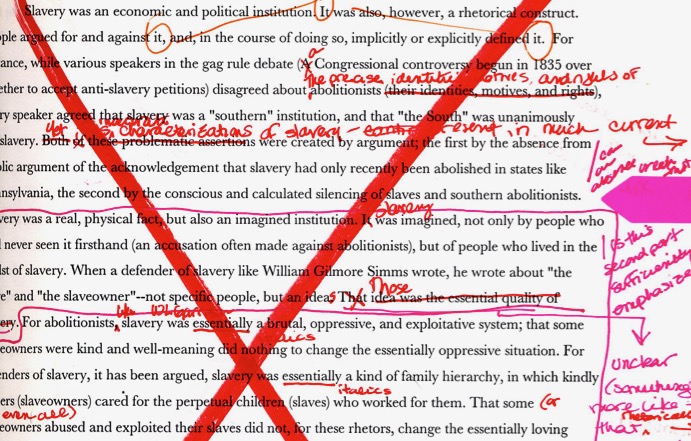
In elementary school, I was taught to write in pen, and we lost points if we made a correction on something we’d written. When I was 11, my family went to London, and we went to the British museum, and I saw a page of a Jane Austen novel. SHE CROSSED THINGS OUT. My first reaction was as though I’d caught her cheating at cards, or pilfering from the collection plate. My second (and much later) reaction was that punishing someone for correcting their own writing was indefensible.
When I was a newbie grad student, I was TA for a rhetoric prof who, in the midst of a lecture about something or other (he was a good prof, so it was a good lecture, but I don’t remember them) related a story about Yeats. Apparently, there was some filmed interview with Yeats, where the interviewer asked about a particular word in one of Yeats’ most famous poems, and Yeats is supposed to have said something like, “Yeah, I don’t like that word,” and crossed it out and tried a few others. According to the prof, the interviewer was horrified. For him, the poem was an autonomous mobile floating in space. For Yeats, it was something he was still trying to get right. The prof’s point was that no writer is satisfied with what they’ve written; poems are not sacred texts transcribed from a muse, but even the best are works in progress.
I happened to mention to a friend/writing buddy that I love the last part of “East Coker,” and she didn’t know it. It’s this: http://www.davidgorman.com/4quartets/2-coker.htm
So here I am, in the middle way, having had twenty years—
Twenty years largely wasted, the years of l’entre deux guerres
Trying to use words, and every attempt
Is a wholly new start, and a different kind of failure
Because one has only learnt to get the better of words
For the thing one no longer has to say, or the way in which
One is no longer disposed to say it. And so each venture
Is a new beginning, a raid on the inarticulate
With shabby equipment always deteriorating
In the general mess of imprecision of feeling,
Undisciplined squads of emotion. And what there is to conquer
By strength and submission, has already been discovered
Once or twice, or several times, by men whom one cannot hope
To emulate—but there is no competition—
There is only the fight to recover what has been lost
And found and lost again and again: and now, under conditions
That seem unpropitious. But perhaps neither gain nor loss.
For us, there is only the trying. The rest is not our business.
I’ll admit that I deliberately misinterpret this poem. He was the kind of modernist who believed in the objective/subjective split, and so he means something by that “imprecision of feeling…squads of emotion” that I think is nonsense. What I think is true is that we bring to writing a lot of feelings—imposter syndrome, fear of failure, anxiety about readers who are fully committed to reenacting generational trauma, perfectionism—that are undisciplined squads of emotion, attacking us every time we try to write.
And, so I find this poem https://allpoetry.com/Love-The-Wild-Swan really helpful in response:
“I hate my verses, every line, every word.
Oh pale and brittle pencils ever to try
One grass-blade’s curve, or the throat of one bird
That clings to twig, ruffled against white sky.
Oh cracked and twilight mirrors ever to catch
One color, one glinting
Hash, of the splendor of things.
Unlucky hunter, Oh bullets of wax,
The lion beauty, the wild-swan wings, the storm of the wings.”
—This wild swan of a world is no hunter’s game.
Better bullets than yours would miss the white breast
Better mirrors than yours would crack in the flame.
Does it matter whether you hate your . . . self?
At least Love your eyes that can see, your mind that can
Hear the music, the thunder of the wings. Love the wild swan.
When I’m editing my work, I frequently have that first line in my head.
I’ve always assumed that he’s writing about his worrying that he’ll never write a poem as good as Yeats’ “Wild Swans at Coole,” and that may be true. But, as a writer, I like the ambiguity that it’s both about the fear of not measuring up to that poem and not measuring up to the reality he was trying to describe—the wildlife of California at that moment. I suspect he’s writing about a Great Blue Heron. I’ve written elsewhere about what a Great Blue Heron meant in my life, so maybe I’m just projecting. California has no shortage of beautiful birds, and Great Blue Herons don’t have a white breast.
And I love the answer—anything we write will never measure up to reality. We can hate our writing, hate our selves, but still continue to write because we love the thing we’re trying to write about.
Good writing has to come from love, I think. In working with graduate students, I’ve often felt that there was a theme—in the musical sense—in the topics that interested them. So much about being a graduate student is demoralizing, probably unnecessarily, but it seems to me that the students who finish (and the junior scholars who publish enough to get tenure) do so because they’ve heard the music. Or someone has helped them hear it.
I know that there are faculty who believe that their job is to “train” graduate students, “toughen them up,” create disciples. I always thought my job was to help them hear the music.
I’m not saying that people should follow their bliss. That’s toxically bad advice. I am saying that finishing a dissertation (or publishing a first book) is less fraught if people can be passionate about something in their project. Passionate enough to want to write about it, without aspiring to turn it into taxidermy.
Love the wild swan.

